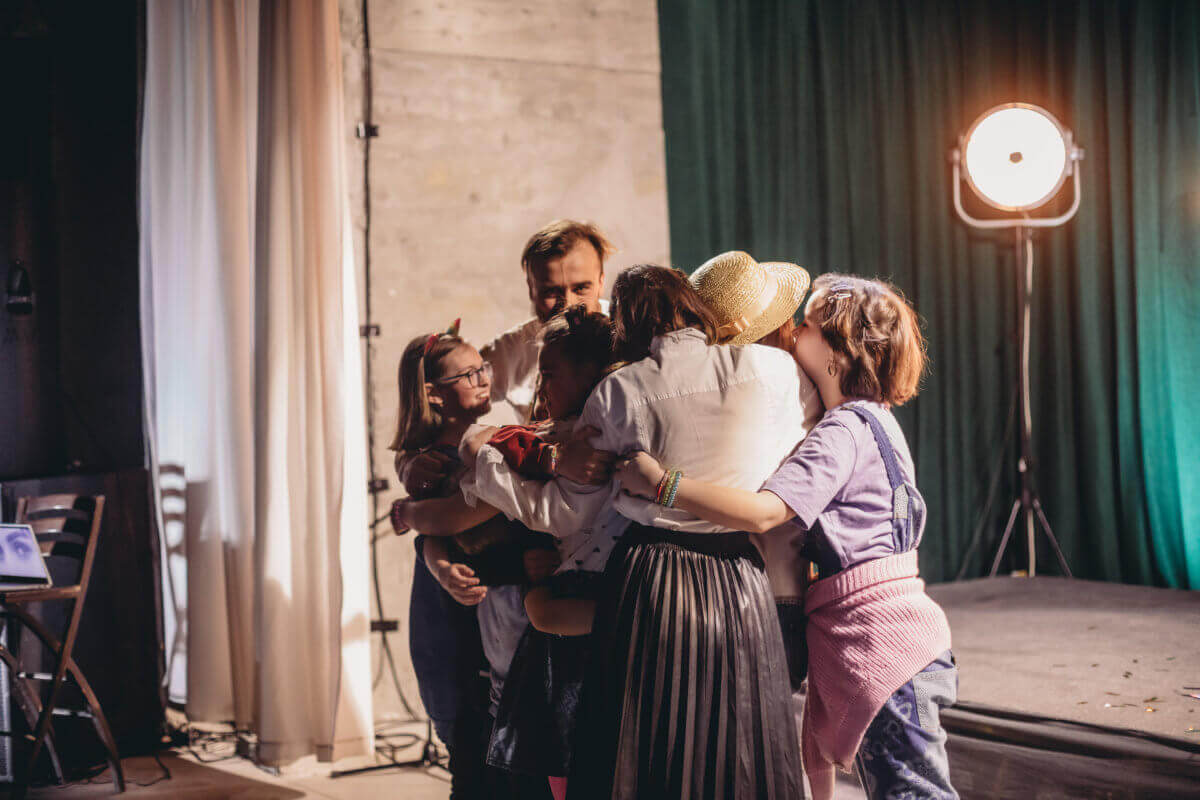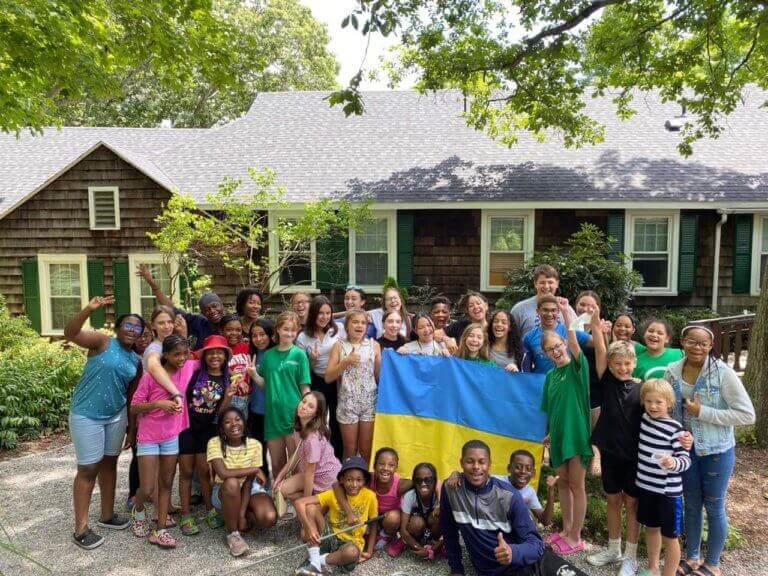Fort Greene's Irondale Hosts Young Ukrainian Actors and Their Active-Duty Director
The Ukrainian play, “Mom on Skype” started to come together before the war began, said director Oleg Oneshcak, an arts teacher turned active-duty soldier.

Nine young Ukrainian actors gathered in Lviv in late April to perform “Mom on Skype,” a new play, in a bomb shelter as the war raged on. On Aug. 13 and 14, the troupe will perform the play at the Irondale Center in Fort Greene. Photo via Oleg Oneshchak
In late April, Terry Greiss, the executive director and co-founder of The Irondale Center in Fort Greene, got a message from the theater’s co-founder and artistic director Jim Niesen. It was a link to a New York Times photo essay documenting a group of nine Ukrainian children performing a new play in a bomb shelter in Lviv, just two months after the Russian invasion began.
“This will inspire you,” Niesen wrote.
“I read the article and thought, ‘This is one of the most courageous things I have ever heard of,’” Greiss said. “In the midst of a horrible war, these children have decided to do a play.”

He has long preached the importance of theater as more than just a form of entertainment – it’s necessary to culture and communities, he said. He wanted to bring the play to Brooklyn. Three months later, the actors landed in the U.S. to prepare for a two-day run of their play, “Mom on Skype,” at the Irondale. They will perform on August 13 and 14, after a week of rehearsals.
‘Line in our lives’
The play started to come together before the war began, said director Oleg Oneshcak, an arts teacher turned active-duty soldier. “Mom on Skype” tells the true stories of Ukrainian “social orphans,” left without parents not by death, but by other forces.
They were forced to stop rehearsals in late February, when the Russian invasion of Ukraine began and forces attacked the capital city of Kyiv.
“Unfortunately now we have the following line in our lives in Ukraine, ‘before the war’ and ‘after the war,’” Oneshcak told Brooklyn Paper via a translator. “It all started before the war. One week was left before the premiere, before the first performance was supposed to happen. And then, chaos began. People were leaving, moving. Some people were enlisting in the army.”
Leadership began conscripting military reservists and restricted the movement of men of military age.
At the end of March, one of Oneshcak’s friends suggested reviving the play and staging it in the bomb shelter of his business in Lviv.

“He has a good shelter, the shelter was an ideal place for a performance, because it was safe,” Oneschcak said.
He and his wife, Mariia, called around to the actors, who range in age from 10-14, to see where they were and if they could return to resume rehearsals. They were thrilled to return to their arts circle, he said, and to continue performing.
The stories of “Mom on Skype” are true, gathered from the children themselves by a local writer, who edited them into a play.
“We had a huge migrant movement in the ’90s, when people, especially women, in the beginning, because there was a demand for jobs for women … would leave their children and travel to Europe to make money,” Oneshcak explained. “These are seven stories, seven children telling their stories of how they were left without parents.”
Most of the stories don’t have happy endings, Mariia said — just one, placed at the end of the show, features a mother coming back to her child.
“The children seem to tell their stories about the way they live and try to decorate them,” she said. “They do not want to sound sad, so they invent happy stories, but their real circumstances they go through … you can tell what’s going on through some of the details that you cannot hide.”
In one story, she said, a child talks about being happy because they have plenty of sweets and the freedom to eat them — but, in the evening, sit and look at the dark windows of their house “because no one is waiting for us there.”
The main message of the play is that parents don’t realize they don’t need to make enough money to give their children physical objects to make them happy — their physical presence is the most important gift, Mariia said.
“Especially now in the circumstances, in the conditions of war, again, we are able to reassess the importance of being with our dear ones, being together,” she said. “Everything else just vanishes, becomes unimportant, and the real values become obvious.”
The little group started preparing to stage the play at the end of April, just after Easter. Oneshcak took time away from the army whenever he could to take part in rehearsals. They raised money for the production itself and for Ukraine’s armed forces, and the actors were happy to feel engaged with what was going on in their country, like they could help somehow. Oneshcak and Mariia’s 12-year-old daughter, Hannah, closes the show with a patriotic Ukrainian song.
Getting ‘Mom on Skype’ to the Irondale
Shortly after the performance, Oneshcak got a Facebook message from Greiss, who proposed bringing the production to Brooklyn. Oneshcak, the actors, and their families were thrilled by the idea.
“I had no idea what it would take, I had no idea how much money it would cost to get them here, to make it all happen,” Griess said.

They started raising money to pay for the costs of travel — the actors, Oneshcak and Mariia would first travel to Poland, then fly to the U.S. — accommodations, and the chance for the teens to have a proper reprieve from the war by having some fun in New York City and at a theater summer camp in Connecticut.
The schedule was tight and the embassy in Warsaw was swamped, with no visa appointments available for the group — so Griess reached out to his local elected officials, Senator Chuck Schumer and U.S. Rep. Hakeem Jeffries, who “went to bat,” successfully securing slots for the troupe.
Two weeks before the show is set to debut at Irondale, Mariia and the nine children were enjoying music and sunshine at the performing arts sleepaway camp in Connecticut. The kids were shocked at how friendly Americans are, Mariia joked, even at Customs when they arrived at the airport.
“They made friends with the American children here, they eat together, they play together, they are having activities together,” Mariia said. “We are very glad when we see all of that. The children were able to rest after the journey, after the trip all the way here. The camp is amazing, what we saw here — talented children who sing, who act, who perform. It’s enriching, culturally enriching.”

She is teaching the American campers Ukrainian songs, and they have started picking up words and phrases in Ukrainian, she said.
But Oneshcak was still in Ukraine, hoping his visa came through in time. An enlisted soldier, he had to fight for permission to leave the country, which he didn’t receive until after the rest of the group had already arrived in the U.S.
The laws around conscription and restricting travel for soldiers were written up a long time ago, Oneshcak explained, when the possibility of such a war seemed slim. That’s part of why he had so many hoops to jump through.
“There are many actors and professions of culture who are in the army right now, who are fighting,” he said. “But at the same time there’s a need for people who will go abroad and who will tell about what is happening.”
See “Mom on Skype” at The Space at Irondale on Saturday, August 13 and Sunday, August 14 at 7:30 p.m.
Editor’s note: A version of this story originally ran in Brooklyn Paper. Click here to see the original story.
Related Stories
- Brooklyn Students Paint Prospect Park Benches With Artwork Against War, Bullying
- Protestors Take to the Coney Island Boardwalk to Call for an End to War in Ukraine
- Rooted in Community: A Theater Company Grows in East New York
Email tips@brownstoner.com with further comments, questions or tips. Follow Brownstoner on Twitter and Instagram, and like us on Facebook.





What's Your Take? Leave a Comment